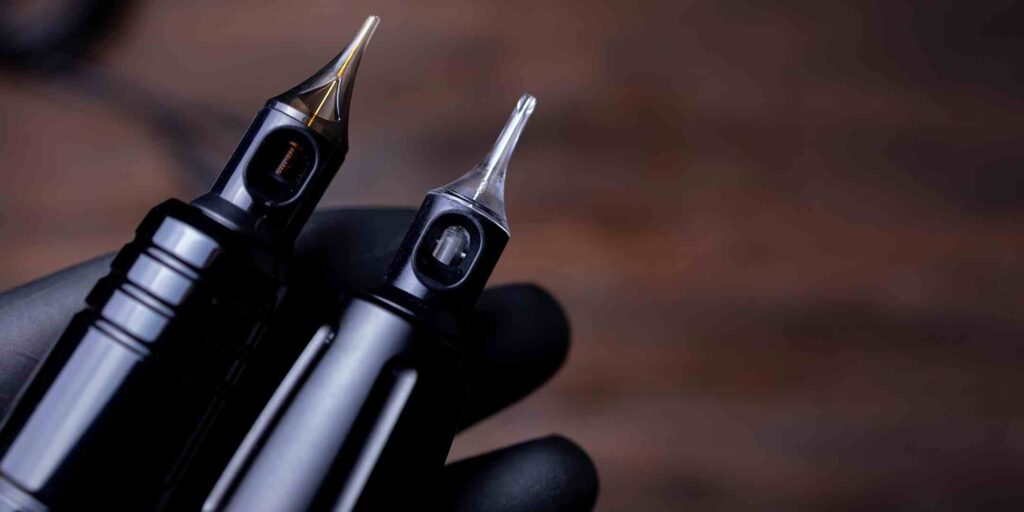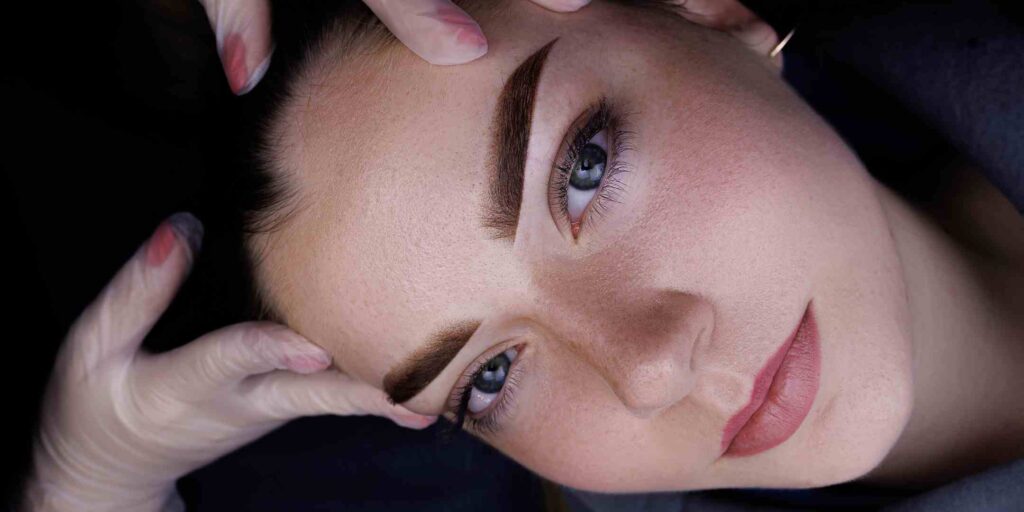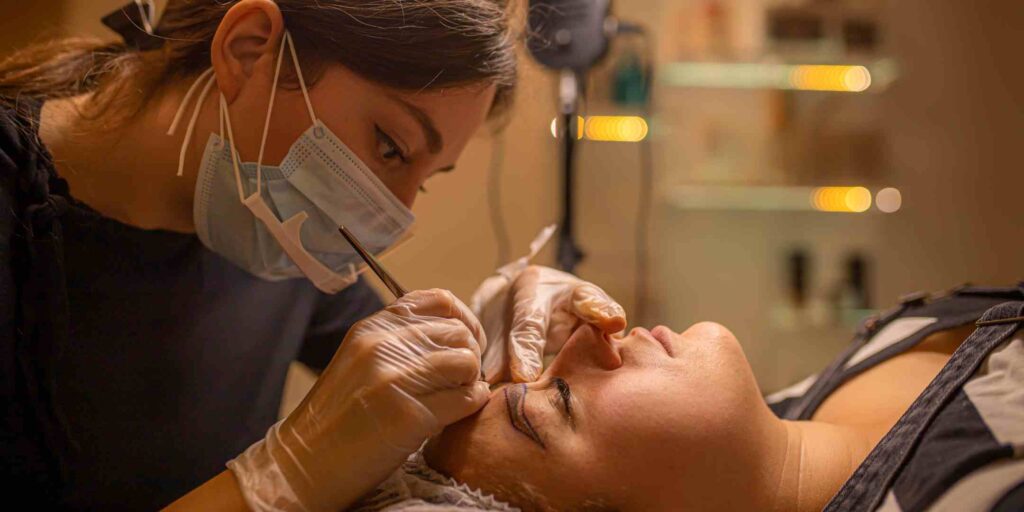How Safe Is Cosmetic Permanent Makeup?
Is it a good idea to get cosmetic permanent makeup?

Cosmetic permanent makeup, often known as micropigmentation, offers the convenience of not having to reapply makeup daily.
Understandably, you might be intrigued by the promise of waking up every morning with perfect eyebrows, eyeliner, and lip color.
However, it’s normal for safety concerns to emerge when considering this long-lasting beauty treatment.
Is Cosmetic Permanent Makeup Bad for You?

Cosmetic permanent makeup can offer convenience and long-term cosmetic solutions, but you need to be aware of the potential risks and necessary aftercare to avoid any adverse effects.
Understanding Risks and Complications
Cosmetic permanent makeup involves implanting pigments into your skin to mimic the appearance of conventional makeup. It’s similar to tattooing, which means it shares some of the same risks:
⦁ Infection is a primary concern, mainly if the equipment used is not properly sterilized. You might experience allergic reactions to the pigments or develop skin conditions such as granulomas or keloid formation.
⦁ Another risk to consider is MRI complications; though rare, the presence of pigments in your skin can interact with magnetic resonance imaging.
It’s crucial to research qualified practitioners who maintain high standards for hygiene and quality.
Aftercare and Healing Process
After receiving cosmetic permanent makeup, you must follow a strict aftercare regime to facilitate healing and prevent complications. Keep the treated area clean and avoid exposure to the sun. Your specialist should provide detailed aftercare instructions, including healing ointments to promote recovery and prevent infection.
Your healing process includes:
⦁ Initial healing may take about a week, during which swelling and tenderness are normal.
⦁ Long-term care includes avoiding exfoliants, sun exposure, and adhering to touch-up schedules as recommended.
Remember, while the makeup is termed “permanent,” it does tend to fade over time, and maintenance sessions may be required to keep the appearance fresh and vibrant.
By understanding the potential risks and strictly following aftercare advice, you can minimize the chances of cosmetic permanent makeup being harmful. Always consult certified professionals who adhere to the safest practices.
Does Cosmetic Permanent Makeup Cause Cancer?

When considering cosmetic permanent makeup, also known as micropigmentation or cosmetic tattooing, one question you might have is whether it poses a risk of cancer. It’s important to understand that no direct evidence links the procedure to cancer.
However, permanent makeup safety depends on various factors, such as pigment types and skin conditions.
Some are concerned about the ingredients in the pigments. For example, iron oxide is commonly used in cosmetic tattooing; this compound is generally considered safe.
The Pros and Cons of Permanent Makeup discuss the components used in the procedure, providing more insight into what you’re introducing to your skin.
Further scrutiny comes from using potential allergens in cosmetic products, which can cause skin irritations or allergic reactions. To minimize the risk, it’s crucial to ensure you’re not allergic to any components the technician uses.
Here are a few considerations:
⦁ Understand the sterilization protocol of the equipment
⦁ Review ingredient lists for potential allergens
⦁ Discuss any personal skin conditions with your specialist
In conclusion, while permanent makeup doesn’t directly cause cancer, you should take precautionary measures to ensure your overall well-being. Consulting a medical professional is prudent if you doubt the safety of the pigments or application process used in permanent makeup.
Cosmetics and Cancer Risk by the American Cancer Society offers a broader perspective.
Remember, staying informed and cautious can help ensure that permanent makeup is safe.
Frequently Asked Questions:
Before attempting permanent makeup, it’s essential to understand the procedure’s specifics, durability, variety, and suitability for different individuals.
What are the common side effects of permanent makeup procedures?
After a permanent makeup session, you may experience swelling, redness, and tenderness in the treated area. These are typical reactions and should subside within a few days. In some cases, there might be bruising or scabbing as part of the healing process.
How long can I expect my permanent makeup to last?
Permanent makeup is more durable than traditional tattoos. Typically, the results can last one to three years. Sun exposure, skin type, and lifestyle can influence its durability. Regular touch-ups are recommended to maintain the appearance of the makeup.
What are the different types of permanent makeup available?
Permanent makeup options range from eyebrow microblading, eyeliner, lip liner, to complete lip color enhancements. The type of permanent makeup you choose should align with your aesthetic goals and lifestyle needs.
Can you describe the before and after effects of permanent makeup?
Before the procedure, the targeted area may appear natural, with no significant enhancements. After permanent makeup, you’ll notice a distinct intensification of color and definition, which softens within a week as it heals, leaving a more subtle and natural-looking enhancement.
Who are ideal candidates for permanent makeup, and who should avoid it?
Individuals who desire a lasting enhancement of their facial features without the daily application of traditional makeup are ideal candidates. Those with allergies to makeup, vision impairments, or steady hands may significantly benefit. However, people with certain skin conditions, immune disorders, or allergies to pigment may need to avoid these procedures.
How does microblading differ from other permanent makeup techniques?
Microblading involves using a manual tool to create hair-like strokes to enhance the eyebrows’ natural appearance. This technique is more superficial than other forms of tattooing, focusing on adding fullness and shape to the brows. Compared to other permanent makeup methods, it tends to have a shorter retention span.
Who should avoid cosmetic permanent makeup?
Cosmetic permanent makeup can be a time-saver and confidence booster, but it’s only suitable for some. Below, you’ll find critical considerations to help you determine if this path isn’t the right one for you:
⦁ If you have skin conditions such as psoriasis, eczema, or keloid scarring, especially in the area where you want to apply the makeup, it’s wise to steer clear. These conditions can affect healing and pigment absorption.
⦁ Your body’s healing capacity is vital for procedures like permanent makeup. A weakened immune system, caused by conditions like diabetes or autoimmune diseases, increases the risk of infection and complications.
⦁ You should be tested for allergies before committing. If you’re allergic to certain dyes or metals in the ink, it’s best to avoid the procedure.
⦁ It’s generally advised to avoid cosmetic permanent makeup during pregnancy or breastfeeding due to the lack of research on the effects of the pigments and procedure in these conditions.
⦁ If you’re undergoing chemotherapy or other significant medical treatments, postponing permanent makeup is recommended. Your skin might be more sensitive, and there is an increased risk of complications.
If any of these situations apply to you, it might be best to forgo cosmetic permanent makeup or seek advice from a medical professional. Your safety and health should always take precedence.